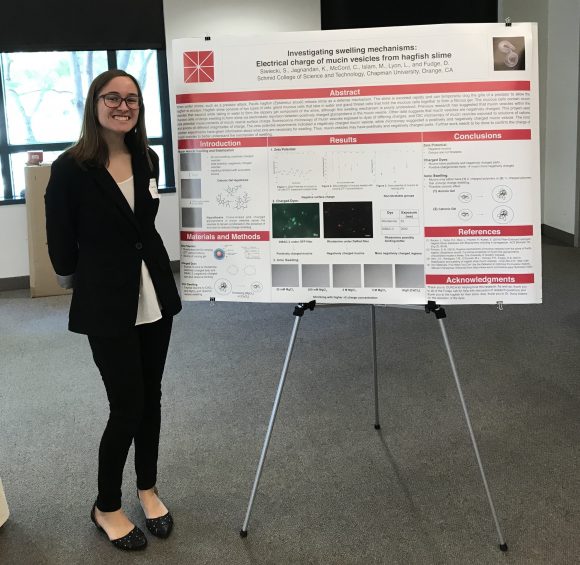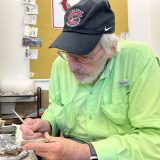Off to Yale with a NSF Graduate Research Fellowship Alumni Spotlight: Sara Siwiecki '18
April 22, 2019
Congratulations to biochemistry and molecular biology alumna Sara Siwiecki ’18 who was awarded a National Science Foundation Graduate Research Fellowship. This fellowship will support Sara as she starts in the Ph.D. program in biochemistry, biophysics, quantitative biology, and structural biology at Yale University this upcoming fall.
“I would like to thank Dr. Fudge for all his help in the lab all the time and helping me with the research statement writing process. I would also like to Dr. Gaurav Jain for being a great labmate, always giving great advice about graduate school and all his help with my research and personal statements. In addition, I would like to thank Dr. Kim for organizing the SCI 400 class, encouraging everyone to apply for the GRFP, and giving great tips about the application. I would also like to thank Dr. RG for first encouraging me to get involved with science during my first year at Chapman and making me realize my love for research!” – Sara Siwiecki ’18

As an undergrad, Sara worked with Dr. Douglas Fudge, post-doc Dr. Gaurav Jain and Dr. Andrew Lyon on research projects related to the biophysics of mucous expansion in hagfish slime. Through this work, she became interested in working on biomaterials and cell biophysics. Following graduation, Siwiecki worked as a full-time research assistant in Dr. Fudge’s research lab to finish her project on hagfish mucous.
Siwiecki decided to attend Yale because of its vast amount of opportunities for biophysics and bioengineering research, and professional development resources. She initially applied to Yale due to a great summer research experience there two years ago in their Physical & Engineering Biology program. Read more about Sara’s summer experience here.
The NSF GRFP is one of the most competitive and prestigious graduate fellowship programs in the sciences. This opportunity opens many doors for Siwiecki, including exclusive internships at government agencies. Siwiecki shared her advice for those interested in applying for a graduate research fellowship, “My advice would be to start early, read the program solicitation/application requirements in depth, read lots of examples of statements from past winners, brainstorm with your advisors and peers, and have as many people as possible proofread your statements. I also would suggest taking SCI 400 because the class is structured around the GRFP and applying to graduate school, and everyone reviews each other’s statements, which is super helpful. Having a couple meaningful research experiences to write about and getting feedback from others on your research and personal statements are the most important parts of the application process!” Siwiecki offered to be a resource to anyone who has questions about applying to grad school or the NSF GRFP. If you have questions for Siwiecki you can contact her here.


